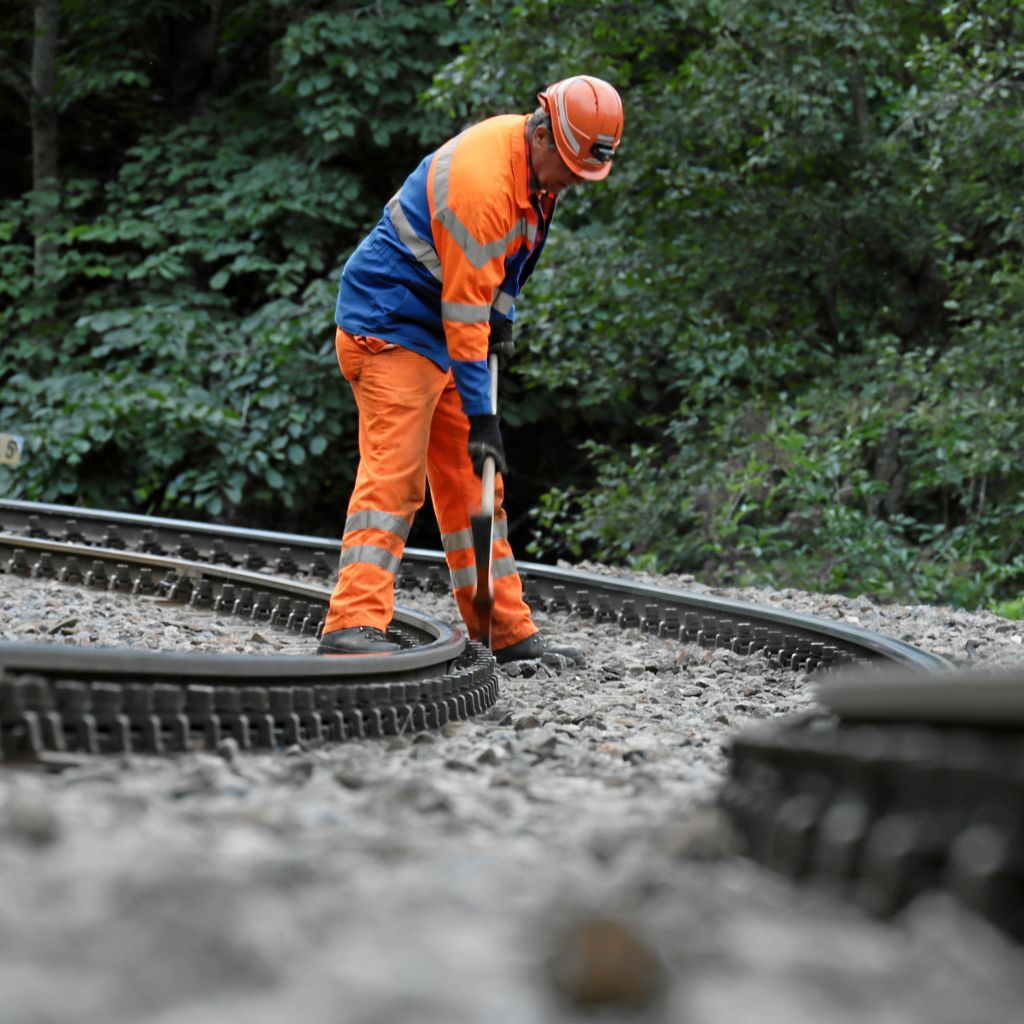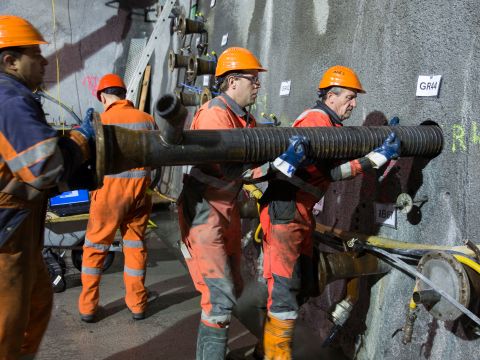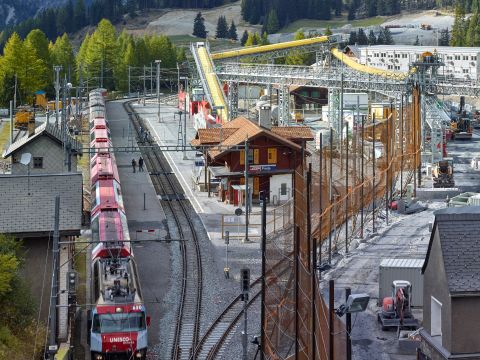At work for the rebuilding of the Albula Tunnel

Many employees will be contributing, over the next few years, to the successful completion of the Albula Tunnel project. Professionals from various sectors will be making a collaborative effort on the extensive construction site.
The many railway employees deployed in the course of the project will be responsible both for on-site train movements and for the safe and reliable operation of rail traffic through the new Albula Tunnel. While track workers deal with arriving and departing materials, the management of the many construction-site trains involved and installation of track equipment, the site’s construction workers are responsible for a piece of infrastructure that will benefit future generations. They are working day and night and at full capacity, both on and deep inside the mountain, on the construction of the new Albula Tunnel.
Railway-related jobs
Swiss-state-certified (EFZ) logistics specialists (managers of shunting operations)
State-certified specialists in railway logistics, deployed mainly at stations and storage facilities. Coupling and uncoupling of trains in the course of shunting operations. Familiarity with train-driver communications media such as radio and whistle signals. Additional deployment in the storage facility and at the station, with responsibility for luggage/goods logistics.
Construction-site activities related to the new Albula Tunnel
-
Formation and braking calculations for the construction-site and goods trains used to deliver materials and carry away waste
-
Monitoring of site trains
-
Shunting operations in the site-station facilities
Swiss-state-certified (EFZ) track construction worker
Track construction workers travel around the railway network for the purposes of track-laying and railway maintenance. Their tasks include the installation and maintenance of track facilities and points, the monitoring of certain stretches of line, and the completion of repair work. They also carry out excavation tasks for the track substructure, drain the subsoil and install temporary supply conduits. Their job is to ensure that the railway network operates smoothly and safely.
Construction-site activities related to the new Albula Tunnel
-
Removal of tracks from the old Albula Tunnel
-
Laying of tracks in the new Albula Tunnel
-
Installation of control and safety components (including the block-post token system for single-track running in two directions)
-
Installation of station platforms at Preda and Spinas for the loading and unloading of construction materials
-
Site safety and security, installation of road signs and stop signals
Network electrician with state approval (EFZ) to work on track overhead
Track overhead is the vital lifeline of our system of public transport. Without electricity, our passenger and goods trains would not run. State-approved network electricians specialising in track overhead ensure that trains are supplied with the energy that allows rail traffic to operate. They use works trains equipped with cranes and cherry pickers for this purpose. These tasks are often carried out just before or after normal running times, or at night, so as not to interfere with public transport operations.
Construction-site activities related to the new Albula Tunnel
-
Installation of the overhead equipment (including overhead conductor rails) in the new Albula Tunnel
-
Removal of the overhead from the old Albula Tunnel
-
General maintenance of overhead equipment
Locomotive driver
Locomotive drivers operate electric or diesel trains along defined sections of the railway network. They are responsible for the passengers and goods being transported, for the rolling stock in use and for safe and punctual operation. A thorough knowledge of the corresponding regulations and signals helps to ensure that trains run at the right speed and in accordance with the timetable. The driver must react with a cool head whenever incidents such as delays or breakdowns arise. The driver is responsible for carrying out checks, before the journey begins, of all monitoring equipment, braking devices and other technical equipment along the entire length of the train.
Construction-site activities related to the new Albula Tunnel
-
Shunting operations in construction-site stations
-
Operation of the Albula Sprinter between Preda and Spinas
-
Delivery operations involving other Albula Line goods trains
Construction job descriptions
Construction plant operator
Drivers of construction plant equipment are employed in the site’s underground, overground and track-laying operations. They operate construction machinery in accordance with corresponding working regulations and health and safety rules. They are involved in work-preparation tasks, and carry out monitoring and maintenance operations.
Construction-site activities related to the new Albula Tunnel
-
The machines involved include excavators, dumper trucks and backhoe loaders, plus certain items of very large construction equipment designed to handle such bulk materials as excavated rubble, concrete and gravel
-
Maintenance of construction equipment and the carrying-out of minor repair jobs
-
Monitoring the construction equipment to detect malfunctions at an early stage
Bricklayer
Bricklayers are engaged to work both under and above ground. The latter normally involves the construction of buildings, including residential properties, shopping centres, school facilities or industrial units. Examples of underground workings include bridges, tunnels, sewage systems and other items of infrastructure, such as water-treatment plants or railway networks. This range of tasks also includes maintenance, repair and refurbishment jobs. The varied and challenging tasks involved are carried out using both traditional craftsmanship and modern machinery and equipment.
Construction-site activities related to the new Albula Tunnel
-
Maintenance work in the old Albula Tunnel (refurbishment of tunnel lining)
-
Portal lining of the new Albula Tunnel
-
Lining inside the new Albula Tunnel
-
Laying of temporary supply conduits in the new Albula Tunnel
-
Supporting the team responsible for construction-site equipment, the installation of construction machinery and equipment and the ordering of materials, etc.
Underground blasting expert
Blasting operations play various roles in civil engineering. They are used in underground and overground construction work to loosen rubble, help excavate rock and demolish existing structures. They are also used to create underground galleries, tunnels, caverns and shafts. Blasting for safety reasons (e.g. of unstable overhanging rock) and underwater blasting likewise form part of the day-to-day tasks of the explosives expert.
Blasting experts bear liability for the safe use of explosives. This demands an especially well-developed sense of responsibility. Explosive charges must therefore only be prepared and set off by persons with the corresponding qualifications and permits.
Construction-site activities related to the new Albula Tunnel
-
Inspection of the blasting site and surrounding area, drawing-up of blasting plans with details of requirements regarding explosives and other materials
-
Planning the deployment of personnel and machinery, along with the transport of explosives
-
Establishing the corresponding safety protocol for each blasting operation
-
Direction of drilling operations at the blasting sites in the tunnel, monitoring the insertion of explosives and detonators into the resulting holes
-
Cordoning-off of the blasting area
-
The carrying-out of any vibration metering that might be required during blasting
-
Examination of the ceiling of the old tunnel after blasting
-
Organising the removal of the rubble created by blasting
Mechanic
Construction machinery mechanics maintain and repair plant equipment, vehicles and other items used in underground and overground site workings. They carry out servicing tasks, modify machines and make and adapt spare parts. They proceed with care when carrying out repair work, using computerised equipment to detect possible malfunctions in the machine’s electrical, electronic, mechanical or hydraulic systems.
Construction-site activities related to the new Albula Tunnel
-
Maintenance, servicing and repair of construction equipment
-
Preparation of new machines for initial startup, monitoring and measurement of exhaust emissions and noise levels
-
Maintenance and servicing of dust-extraction equipment, conveyor systems and ventilation equipment, etc.

